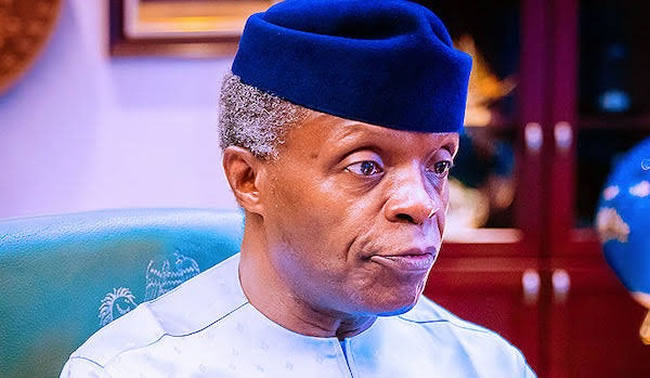Vice President Yemi Osinbajo, on Monday, observed that despite the nation’s infrastructure deficit, its health care system is robust.
Speaking at the International Conference on Health Access beyond COVID-19 in Abuja, he expressed the belief that there are already clear indications that “we are well on the way,” to getting the job done.
Osinbajo highlighted the country’s strengths in the areas of healthcare while emphasising major steps the country needs to take in order to improve its health system.
According to him, one of the eye-openers from the COVID-19 pandemic “is that despite infrastructural weaknesses we have an experienced and robust public health system, peopled by some of the best personnel in the world, but more importantly (is) the huge opportunities for becoming a leading nation in healthcare.”
Buttressing his point on building local capacity, the Vice President noted that the pandemic revealed further that “every nation is on her own in a global pandemic, and how vaccine-rich nations at some point even banned exports in order to meet local needs, it is clear that we must take our destiny in our own hands. And there is great potential.
“Last December, the Nigerian Institute of Medical Research (NIMR) launched a new set of COVID-19 test kits that can produce results in 57 minutes. The new kit was designed by Joseph Shaibu, a molecular virologist at NIMR.”
A statement issued by his spokesman, Laolu Akande, further quoted him as saying: that “the healthcare system of our dreams is ahead of us, we know what we want and what is possible. We have the men and women with the required expertise; what we need is more diligent and focused management.
“Only recently the President established the Healthcare Reform committee which I have the privilege of chairing. That may well be at least one of the vehicles for ensuring that we are able to get some of our dreams comes true.”
Establishing the health sector reform committee is one of the ways the President Muhammadu Buhari Administration is making concerted efforts towards transforming the country’s health sector.
According to the Vice President, other ongoing measures include funding for healthcare research and developing solutions in pharmaceuticals and medical consumables; and the health sector component of the Economic Sustainability Plan (ESP).
“It is evident that the way forward is more funding for health care research and for innovators to develop solutions in pharmaceuticals and medical consumables, the VP disclosed.
He continued: “Our administration established the Healthcare Sector Intervention Fund Facility which has disbursed N76.98 billion to finance the acquisition and installation of critical medical equipment as well as the expansion of production lines in various pharmaceutical companies across the country.
“The Central Bank of Nigeria is also supporting a number of research and development initiatives in the health sector. In all, a total of N233 billion in grants has been disbursed.”
“In our Economic Sustainability Plan, designed to mitigate and take advantage of the consequences of the pandemic. One of the cross-cutting issues identified for action was the development of Nigeria’s capacity to become Africa’s hub for the manufacture of generic drugs.”
Osinbajo further emphasized the government’s commitment to supporting pharmaceutical and research agencies to develop and manufacture vaccines locally, and so enhance Nigeria’s domestic pharmaceutical capacity.
“In his Independence Day speech, the President also noted that the Nigerian Sovereign Investment Authority is raising a $200 million fund for this initiative that will complement the Central Bank of Nigeria’s ongoing N85 billion Healthcare Sector Research and Development Intervention Scheme to support local researchers in the development of vaccines and drugs to combat communicable and non-communicable diseases, including COVID-19,” the Vice President restated.
He further explained that Nigeria‘s existing public health infrastructure was crucial in helping the country respond effectively to the global pandemic.
“The Ebola outbreak of 2014 and our ongoing battle with Lassa fever and our successes with polio eradication helped us to tighten our epidemic contingency plans, strengthen our emergency coordination and surveillance capacities, and also to invest in public health laboratories,” he asserted.
Also, he recalled that during the Ebola outbreak in West Africa, between 2014 to 2016, “the first case in Nigeria was confirmed and sequenced at the African Centre of Excellence for Genomics of Infectious Diseases (ACEGID), The Center was also instrumental in containing the epidemic in the sub-region by the development of a 15-minute Rapid Diagnostics. This method was approved by the World Health Organization and the Food and Drug Administration, FDA of the US government.
“One of the key lessons we learned from our response to the Ebola outbreak was the need to build systems in ‘peace time’ that can be used during outbreaks. The Nigeria Centre for Disease Control (NCDC) which was founded in 2011 was made an independent government agency in 2018 as we prioritised the strengthening of our public health infrastructure… it is evident that the NCDC is one of the best prepared and resourced, at least in Africa.”
According to the Vice President, “we were able to scale up on testing and case management capacity, quickly activating 120 laboratories nationwide – from 5 just before the pandemic – most of them public laboratories. Also, we expanded the footprint of our sovereign public health response capabilities especially at the sub-national levels and in areas where previously such capabilities did not exist.”
Osinbajo also noted the widely acclaimed work of the Presidential Task Force on COVID-19, in coordinating the national response, commending the effort led by Secretary to the Government of the Federation, Mr Boss Mustapha.
“The task force swiftly issued and enforced COVID-19 protocols for travel and general movement. When the first doses of vaccines came, the task force developed the protocols and the public health system already used to mass vaccination campaigns, deployed across the country in every nook and cranny of Nigeria so that the first eligible vaccine candidates received their vaccinations seamlessly,” he said.
Going forward, the Vice President stated that African countries must take a proactive approach in responding to the slow pace of getting access to COVID-19 vaccines.
“Although we have received some help from friendly nations and the Covax alliance, less than 4% of our eligible population will have been vaccinated by the end of the year. There is no question that we cannot afford not to have our own vaccine production facilities,” he stated.
He also called for a private sector-led initiative to make the country self-sufficient in basic drugs and in being a net exporter to Africa, noting, again, that Nigeria has the human capital to build a more efficient health care system.
For instance, he disclosed that “Nigeria is in talks with the World Bank’s private lending arm and other lenders to raise about $30 million to help finance a vaccine plant, Biovaccines Nigeria Ltd.”
YOU SHOULD NOT MISS THESE HEADLINES FROM NIGERIAN TRIBUNE
Viral Voice Note On WhatsApp Billing False
Claim: A viral WhatsApp voice note, purportedly made by the director and CEO of WhatsApp, claims users will have to start paying for WhatsApp services.
Verdict: The viral WhatsApp voice note claim is a hoax. The content is not new and has been circulated as a broadcast message several times in the past.Despite infrastructure deficit Nigeria health system robust ― Osinbajo
Despite infrastructure deficit Nigeria health system robust ― Osinbajo
WATCH TOP VIDEOS FROM NIGERIAN TRIBUNE TV
- Let’s Talk About SELF-AWARENESS
- Is Your Confidence Mistaken for Pride? Let’s talk about it
- Is Etiquette About Perfection…Or Just Not Being Rude?
- Top Psychologist Reveal 3 Signs You’re Struggling With Imposter Syndrome
- Do You Pick Up Work-Related Calls at Midnight or Never? Let’s Talk About Boundaries







